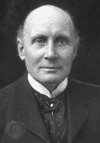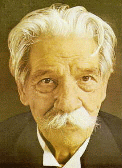Before the book itself begins, a page reads what I have in the title, "THEY SAY. WHAT THEY SAY, LET THEM SAY (Motto of Marischal College, Aberdeen)." This was Bell's college in Scotland. Bell's science fiction was published under the name, "John Taine".
 After stating this motto, Bell lists several sayings, of which I select a few.
After stating this motto, Bell lists several sayings, of which I select a few.
"A mathematician who is not also something of a poet will never be a complete mathematician.", Karl Weirstrass (1815-97), great German mathematician.
"Mathematics is Queen of the Sciences, and Arithmetic is the Queen of Mathematics.", Carl Friedrich Gauss (1777-1855), great German mathematician.
"The different branches of Arithmetic -- Ambition, Distraction, Uglification, and Derision." The Mock Turtle (Alice in Wonderland.)
"God made the integers, and all the rest is the work of man.", German mathematician, Leopold Kronecker (1823-91),
Here is a collection of other sayings.
"The proper study of mankind is woman and, by common agreement since the time of Adam, it is the most complex and arduous.", Henry Adams (descendant of John Adams), in Mont-San-Michel and Chartes.
The famous American anthropologist, Margaret Meade (1901-78), who became famous foe her book, The Coming of Age in Samoa, was once asked if she thought women should be members of our military forces. She explained her negative judment on this by saying, "Women are too dangerous."
"Never doubt that a small group of thoughtful, committed citizens can change the world." Margaret Meade.
"Wherever trees congregate in petitive pose or flowers raise hosannas to the skies, there my father is." (jh)
"A mathematician is like a lover. Grant him one thing and he asks another." Jerome K. Jerome (1859-1927), British novelist and playwright.
Mad! Mad! Mad! Mad! Mad! Math!
Give your brain a bath!
Math-salts make your bean
Think so squeaky clean! (jh)
 "I will not go so far as to say that to construct a history of thought without profound
study of the mathematical ideas of successive epochs is like omitting Hamlet from the play which
is named after him. That would be claiming too much. But it is certainly analogous to cutting out
the part of Ophelia. This simile is singularly exact. For Ophelia is quite essential to the play,
she is very charming ... and a little mad. Let us grant that the pursuit of mathematics is a
divine madness of the human spirit, a refuge from the goading urgency of contingent happenings.",
Alfred North Whitehead (1861-1947), British mathematician, logician and philosopher perhaps best
known for his work in mathematical logic. In collaboration with Bertrand Russell, Whitehead
authored the landmark three-volume Principia Mathematica (1910, 1912, 1913).
"I will not go so far as to say that to construct a history of thought without profound
study of the mathematical ideas of successive epochs is like omitting Hamlet from the play which
is named after him. That would be claiming too much. But it is certainly analogous to cutting out
the part of Ophelia. This simile is singularly exact. For Ophelia is quite essential to the play,
she is very charming ... and a little mad. Let us grant that the pursuit of mathematics is a
divine madness of the human spirit, a refuge from the goading urgency of contingent happenings.",
Alfred North Whitehead (1861-1947), British mathematician, logician and philosopher perhaps best
known for his work in mathematical logic. In collaboration with Bertrand Russell, Whitehead
authored the landmark three-volume Principia Mathematica (1910, 1912, 1913)."Thank God for problems that have solutions!" (jh)
"It is a profoundly erroneous truism, repeated by all copy books and by eminent people when they are making speeches, that we should cultivate the habit of thinking of what we are doing. The precise opposite is the case. Civilization advances by extending the number of important operations which we can perform without thinking about them." An Introduction to Mathematics (1911). To this, I append my own comment. It is a purpose of mathematics to deal with the routine in a routine way, saving much time and money, so that managers, editors, experts can deal with the nonroutine. In the literature, this is known as "management-by-exception", generalizing application of "quality-control charts.
 Here is Schweitzer's famous "Reverence-for-Life Ethic": "I am life which wills to live, in the
midst of life which wills to live.... The will-to-live is everywhere present, even as in me. If
I am a thinking being, I must regard life other than my own with equal reverence, for I shall
know that it longs for fullness and development as deeply as I do myself. Therefore, I see that
evil is what annihilates, hampers, or hinders life... Goodness, by the same token, is the saving
or helping of life, the enabling of whatever life I can to attain its highest development....
Ethics consist in my experiencing the compulsion to show to all will-to-live the same reverence
as I do my own. A man is truly ethical only when he obeys the compulsion to help all life which
he is able to assist, and shrinks from injuring anything that lives....An absolute ethic calls
for the creating of perfection in this life. It cannot be completely achieved; but that fact
does not really matter. In this sense reverence for life is an absolute ethic. It makes only the
maintenance and promotion of life rank as good.... At times we have to decide arbitrarily which
forms of life, and even which particular individuals, we shall save, and which we shall destroy.
But the principle of reverence for life is nonetheless universal and absolute."Albert Schweitzer
(1875-1965), minister, theologian, great organist and rebuilder of historic European organs,
author, physician, missionary, 1952 Peace Nobelist. (Esther and I met this great, sweet man on
his visit to New York City in 1951. He autographed his photo for Esther.) You're watching the
work of Schweitzer whenever you watch an episode of M*A*S*H on TV. You see, Schweitzer
insisted upon adapting his missionary Hospital in Lambaréné, French Congo -- now
Gabon -- Africa, to the simple life of his African patients and their relatives. But this
horrified the Medical Profession at that time, saying it was not sufficiently antiseptic.
Schweitzer persisted and his Hospital became the model for the "mobile hospital units" that
prepped for hospitals in the Korean "Police Action", as seen in the movie, M*A*S*H, and
the TV series.
Here is Schweitzer's famous "Reverence-for-Life Ethic": "I am life which wills to live, in the
midst of life which wills to live.... The will-to-live is everywhere present, even as in me. If
I am a thinking being, I must regard life other than my own with equal reverence, for I shall
know that it longs for fullness and development as deeply as I do myself. Therefore, I see that
evil is what annihilates, hampers, or hinders life... Goodness, by the same token, is the saving
or helping of life, the enabling of whatever life I can to attain its highest development....
Ethics consist in my experiencing the compulsion to show to all will-to-live the same reverence
as I do my own. A man is truly ethical only when he obeys the compulsion to help all life which
he is able to assist, and shrinks from injuring anything that lives....An absolute ethic calls
for the creating of perfection in this life. It cannot be completely achieved; but that fact
does not really matter. In this sense reverence for life is an absolute ethic. It makes only the
maintenance and promotion of life rank as good.... At times we have to decide arbitrarily which
forms of life, and even which particular individuals, we shall save, and which we shall destroy.
But the principle of reverence for life is nonetheless universal and absolute."Albert Schweitzer
(1875-1965), minister, theologian, great organist and rebuilder of historic European organs,
author, physician, missionary, 1952 Peace Nobelist. (Esther and I met this great, sweet man on
his visit to New York City in 1951. He autographed his photo for Esther.) You're watching the
work of Schweitzer whenever you watch an episode of M*A*S*H on TV. You see, Schweitzer
insisted upon adapting his missionary Hospital in Lambaréné, French Congo -- now
Gabon -- Africa, to the simple life of his African patients and their relatives. But this
horrified the Medical Profession at that time, saying it was not sufficiently antiseptic.
Schweitzer persisted and his Hospital became the model for the "mobile hospital units" that
prepped for hospitals in the Korean "Police Action", as seen in the movie, M*A*S*H, and
the TV series.
"I've only to close my eyes and stretch out my arms and Snowball is warm within my embrace, and I am consoled by grace of tongue."
"What we seem to forget is that, yes, the sun will continue to rise and set and the moon will
continue to move across the skies, but mankind can create a situation in which the sun and moon
can look down upon an earth that has been stripped of all life.", Albert Schweitzer. When Dr.
Schweitzer returned from travels to his Hospital, he would be welcomed by his friend, Parcifal
the Pelican. (Image from Albert Schweitzer Institute for the Humanities, http://
www.schweitzerinstitute.org/Mindex.htm.)
"Mind is the music which the body-instrument plays." (jh)
 "The knees are the first to go", Joe DiMaggio.
"The knees are the first to go", Joe DiMaggio.
Disinguished French-American educator, Jacques Barzon, said in his 1959 book, Teacher in America, that young women should have the same curricula as men, with an extra course in public speaking, "So that a room full of women speaking does not sound like an aviary on fire."
"Blues bends the note. Jazz bends the beat." (jh)
"Mathematics is notions, not notations", Carl Friedrich Gauss (considered greatest of all mathematicians, both theorical and applied). [In tests, when students might not remember jargon or symbols, I told students to make up their own, but tell me what they meant by their literals and to use these consistently. I think Gauss might have approved of this.]
"The best thing you can do for your children is to love their mother", a wise Roman Catholic priest.